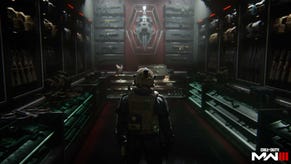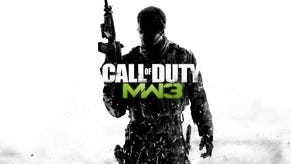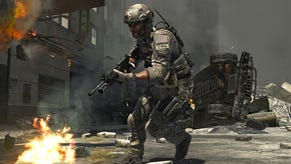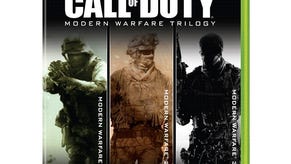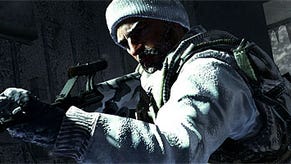"There's nothing like it" - Mark Rubin on Modern Warfare 3
Planning to log some hours with Modern Warfare 3 this weekend? Producer Mark Rubin tells Steph Nunneley what's in, what's out, what's changed, and why.
Call of Duty: Modern Warfare 3 is primed to become this year’s largest entertainment launch ever, if previous installments in the Call of Duty franchise are any indication. But Infinity Ward wasn’t content to just rest upon its laurels and toss a three next to a game it released last year; it looked at what didn’t work in previous iterations, what worked before but was cut due to limitations, and then turned its gaze further afield to other titles.
To hear producer Mark Rubin tell it, the success behind the Modern Warfare games caught Infinity Ward by surprise. Because of this explosive popularity, the team had to figure out how to deal with such a massive player base with so many voices and so many different opinions. This can be continuously and extremely overwhelming, so how did Infinity Ward go about managing the feedback received from tens of millions of people?
“[Listening] is one of the things I feel we are getting better at,” Mark Rubin told a room full of press at Call of Duty XP. “It sounds strange to say you are getting better at listening but that actually is one of the things we have gotten better at.
“We are not only able to find the obvious stuff, like a gun being out of balance or a perk or killstreak is out of balance - the hard stuff is to go through where you have multiple groups who are contradicting themselves.
"Who should I listen to? Which feedback is right and which is wrong? Well, the truth is none of them are wrong. Basically, I should say that we have gotten a lot better at how we listen to the community. I think that's the big first step this game has over the last one.”
Once the team started being able to listen to the player base in a more constructive manner, and before development started on Modern Warfare 3, Infinity Ward sat down and philosophically argued for “weeks and weeks,” over what to implement and what not to, based on player feedback.
In doing this, the team came up with two core tenets - Gunplay, and then something it likes to call "Your Call of Duty".
What should we call playing with guns?
“Gunplay is a bit of an overarching statement, but it boils down to how the weapons feel in your hand as you are running around a map and playing the game modes,” Rubin explained.
“It's something I feel we lost focus on a bit in Modern Warfare 2, and it's something I feel Call of Duty 4: Modern Warfare got down really well, and one of the things people really liked about that game.
“The guns felt right and they also felt unique and different to each other. Assault rifles felt like they had a role to fill it could be successful at - but not necessarily fill every role. SMGs filled a different role, but at the same time it wasn't a long distance laser gun.
"We really focused on making weapon classes feel different this time, and be successful at what they're doing."
“We really focused on making weapon classes feel different this time, and be successful at what they're doing. We don't want people not using certain types of weapons - we wanted them all to be functional, good, and fit various play styles.”
But there were some things the team wanted to guide players into, such as making the actual gunplay part of the primary way players will get kills, thus ending reliance on killstreaks and killstrikes. As well as returning to its core gunplay roots, Infinity Ward had to ensure that killstreaks and the killstreak systems would be balanced.
“The previous killstreak system was based solely on KDR,” Rubin explained. “ It was based on being able to line up kills together and that was it. It met one play style, and one type of player.
"What we have done with Modern Warfare 3 is introduce multiple types of strike packages which actually meet multiple goals as far as the play style. So support will now allow you to be more aggressive and also allow you to be more team oriented.
Some people like objective modes, some like the objectives, some people like to play the objective modes to get high KDRs. Those people can still actually do that, it's just now, with the point streak system instead of the killstreak system, if I cap a flag, if I cap ARB, I am moving my killstreak bar by that - not just by kills. Also I get assists and assists will lead to moving my killstreaks up. That is on all the killstreak strike package types. With support, since it doesn't reset on death, because I can get two kills, die, get two kills die, etc, I am continually upping my killstreak bar - I am getting the killstreak I wasn't getting before because I was so aggressive and wasn't really paying attention to what I was doing by running into frays.
"From a balance standpoint, the amount of kills points players need to get are a little higher in that strike package than it is in assault, but the killstreaks themselves are more balanced towards supporting the teams. For example, the Specialist is really more for your brainy sort of strategic guy who is going to figure out what the best perk combination is going to be.”
Rubin allowed that metrics and player statistics came into play a bit, but only when it pertained to the sort of guns players are using and their kill death ratios; Infinity Ward balances the raw data against the team's knowledge as designers.
Find me a find, catch me a catch
Rubin highlighted Infinity Ward's second core tenet - “Your Call of Duty” - which consisted of adding elements to the game which allowed players to communicate more efficiently with each other, as well as helping players hook up with others of like interests. Through integration with social networks like Facebook, players can log in and see if their friends playing Call of Duty at any given time.
“It's bringing people together more on the social side that we've never done before,” said Rubin.
In addition, more customization has been added, which allows people to not only tweak the game to their playstyle, but also gives them the ability to create their own game modes. Private matches now have game mode templates built in that aren't in the public playlist; modes like Infections, or Juggernaut, Infection Juggernaut or Team Defender are all able to be customized with various settings. These player creations can then be posted on Elite, which if noticed, can be chosen for promotion and subsequently voted on by the community, and added to the public playlist for so that everyone can play it.
Another thing which was added to Modern Warfare 3, which didn't exist in Modern Warfare 2, was making localization and party systems a more robust part of matchmaking.
“We put a lot of work into the parties, fixing a lot of those issues where if you want to party with friends or if the party leader leaves the party gets busted up,” said Rubin. “We have fixed that, and done a lot of work on that end.
“When it comes to game being dropped, there are various aspects to why this happens. If a host looses connectivity or just shuts his box off, there's not much you can do about that because the host just left. But what we have is host migration integrated into the lobby - you don't notice this - but what we're doing in the lobby is we're QOS-ing everyone in the lobby and we're going: 'Okay, which one of you guys is the best host? Okay, we're gonna pick that guy there.' And we go back into the lobby and we do it again, because your internet connection might change.
“So we keep trying to get the right host to be the host. In-game, we do the same thing, but with a sort of more harder lens because we don't want to be switching hosts during the game only if necessary because if the match gets so bad because somebody had a great connection when he started but all of a sudden doesn't we'll switch it over mid-game to make sure the connection stays.”
"Our requirements for bandwidth are now lower than they were in the past despite us now having more features."
As far as the troubling question of PlayStation 3 connectivity in non-US areas was concerned, Rubin thought Modern Warfare 2 did rather well, but admitted that as more features were added, the bandwidth requirements increased, and believes this is what caused some of the issues players faced when playing on the console.
“Then when Modern Warfare 2 came out and then Black Ops came out and we kept having to add new features it means your bandwidth requirements start getting bigger and bigger,” he stressed.
“That obviously leads to problems. One of the thing that we've done a lot with this game is concentrate on performance and keeping those features in but keeping their performance down.
“So we've actually gotten better at it than we were in the past. Our requirements for bandwidth are now lower than they were in the past despite us now having more features.”
Back to the Future
Modern warfare 3 supports dedicated servers, something PC fans feared Infinity Ward might have ruled out. Rubin said it was something Infinity Ward really wanted to do in Modern Warfare 2, but the team just didn't have the capacity to include everything it wanted.
“Obviously in Modern Warfare 2 we wanted to do dedicated servers as well as the Find Match,” he said. “See, Find Match was a new thing we were trying to bring to PC gaming and honestly, hardcore PC gamers probably won't agree, but we had a lot of people who loved using Find Match. That was their preferred way of playing on the PC, because they weren't hardcore gamers.
“I mean, a lot of these guys are fathers or they are working and on a business trip so they bring their laptop with them and want a game they can just hop into in their hotel and play. It's a great experience and that is what we were trying to introduce.
“We didn't have the abilities last time to do anything we wanted or whenever we shipped a game."
“We didn't have the abilities last time to do anything we wanted or whenever we shipped a game, and that is sort of what happened with dedicated servers. With Modern Warfare 3, we have more help with these multiple studios and we can get them to help us with all these tasks.”
This is where Raven, Sledgehammer, and Treyarch came in - while the two primary studios involved are Infinity Ward and Sledgehammer, some Treyarch team members “helped out on a few of the little things”.
“When we first went into this project to figure out how we're going to make the game, we didn't want to divvy it up, like 'here you go do this and we're not going to pay attention, and God I hope it comes out right, and now you guys go do this,' and have everything come together being so different it would be like 'now what are we gonna do?'
“So what we did was took the two studios with similar make-up with engineers, artists, designers, and we took the scope of work we had ans just started working on it. They started working on some stuff, we started working on some stuff, and at any given moment anyone was working on anything between the two studios. Raven and Treyarch, though they helped us out, and are awesome, helped us when it came to extra help on a specific task.”
Infinity Ward was rather lucky it could call upon the extra help, as the team lost quite a few members when the studio founders were fired back in 2010. However, despite a loss of quite a few staffers, some entire teams remained intact, and are still together today.
“It was a rough time,” Rubin admitted. “We kept a lot of core people in every department. I have been a producer, all the way to Call of Duty 2, and I started at the tail end of that one. I was a producer on Call of Duty 4, and for Modern Warfare 2, and from my position, I get the bird's eye view of everybody's, well - everything.
“We had full teams intact - for one, our audio dept didn't lose a single person, and the art department was barely touched too. It was surprising the amount of people, in every discipline, that remained who still retained all the knowledge and learning we had as a studio in the past.”
The retention of knowledge should assure that Modern Warfare 3 will excel in the market as much as previous entities into the Call of Duty series, and Rubin attributes this success to both luck, and the ability for the teams putting out a new Call of Duty game each year to communicate effectively.
“It's down to the teams talking to each other,” he said. “I mean the community is the same really for the most part and we are always trying innovate on their thing and we are always trying to innovate on our thing.
“Treyarch brings a lot of cool, new stuff to it, and I think everybody can agree, zombies are absolutely amazing. We didn't put any zombies in any of the games that we did because we didn't copy that game mode. We do our own stuff, so there is sort of a bit of segregation, and then there's learning - we're both studying each other.
"Black Ops came out and we were like 'oh that's really cool' let's look at what they did there, and it's easier for us because they made this new feature like Theatre and we wondered how that was going to work out. Well, people loved it. So we went in and made our version of Theatre. We had some different rules, things we wanted to do, we saw how it worked for Treyarch and put our own touch it and put it out there.
“So those kind of things we work together on, some of the guys from Treyarch worked with us on Theatre and gave us pointers and tips. That kind of communication helps us not step on any toes constantly and the other thing is having a mutual respect towards the other as game designers.”
Rubin also said that inspiration for various modes or gameplay ideas can come from various places, and since he himself buys and plays almost every game he “can get my hands on” his influences are “ all over the place.”
“I personally didn't get into making games for any other reason, than that I love them,” he said. “I play games at work and then when I go home I play more. So influences are all over the place.
"For instance, the Specialist Strike Package - one of my first thoughts with that when we were first thinking about it, was it was similar to Street Fighter. I mean, it doesn't seem the obvious place to go when you are looking for FPS advice, but you know in SF when you keep moving your bars up, up, and up? Well, the power-up part is sort of like that with Perks. You power up your bar, and then when you die you lose all that. So it was kind of my Street Fighter thing here.
“Obviously, with Survival Mode, zombies were a huge influence on that, so was Horde Mode, Halo's modes, there have been games in the past and I am trying to remember who actually did it, but, absolutely - we look at every single game out there and there is always good stuff. It's just part of design.”
That being said, Rubin said there are tons of features seen in other games that the team think would “be really cool” to implement into the franchise, but in the end if it conflicts with the core gameplay, it “isn't going to happen.”
"We look at every single game out there and there is always good stuff. It’s just part of design."
Modern Warfare 's launch this week is almost guaranteed to break records once more, but Rubin admits the studio is still getting used to the success of the series.
“Call of Duty is a strange phenomenon,” he said. “There is nothing like it in the gaming world at this level that has this size of fanbase.
"I mean look at the fact there are 30 million people playing a game that costs $60 bucks. It was a huge surprise to us when it happened, I mean we made Call of Duty 2, it was a great launch title and sold really well and had a huge attach rate. It was great.
"Call of Duty 4: Modern Warfare came out and it took off and became so popular and no one understood why that happened or how that happened - I mean we are all thankful - but it was really great and we are really tried to keep that going with Modern Warfare 2 and now with Modern Warfare 3 and it is extremely stressful but we will continue that route as we go forward - to be continually stressed out.
“But seriously, you look at the consoles and the numbers and at any given time, over half of the people playing on that console at any given moment are playing a Call of Duty title.
“There's just nothing like it.”





